Add abstract
Want to add your dissertation abstract to this database? It only takes a minute!
Search abstract
Search for abstracts by subject, author or institution
Want to add your dissertation abstract to this database? It only takes a minute!
Search for abstracts by subject, author or institution
by Colin Victory
| Institution: | Kansas State University |
|---|---|
| Year: | 2016 |
| Keywords: | communityplanning; marijuana; colorado; legalization; ordinances; Amendment64 |
| Posted: | 02/05/2017 |
| Record ID: | 2124462 |
| Full text PDF: | http://hdl.handle.net/2097/32672 |
In November of 2012, the state of Colorado officially ended an 80 year national prohibition of recreational marijuana by voting to pass Amendment 64. This shift in state policy generated a multitude of economic opportunities for jurisdictions throughout the state. However, the location and volume of production and sale that is authorized is ultimately determined at the city and county level. Localities in Colorado are charged with regulating the new industry in the same manner as they do other locally unwanted land uses (LULUs) such as sex-oriented businesses, halfway houses and liquor stores. This paper examines community planning approaches involving the legalization of recreational marijuana in rural Colorado. The goal of this report is to serve as a document that can be used by jurisdictions that are poised to legalize in the future, as a reference when examining best practice for the regulation of a new recreational marijuana industry. I collected data through one-on-one interviews with city and county planners throughout Colorado. The focus of the research is two-fold: to determine what approach the planning staff took towards managing recreational marijuana in their jurisdiction and to determine why the planning staff chose the approach that they did. Through the course of this research, I have found that conservative communities are treating recreational marijuana shops as nuisance or vice businesses and are using there zoning and regulatory powers to push the shops outside of city limits. Progressive communities have taken a more inclusive approach and in return are profiting from the new market. The struggle between state law and local public perception in these jurisdictions may be the major reason why some communities are not benefiting from the public revenue being generated by Amendment 64. Advisors/Committee Members: Katherine Nesse.
Want to add your dissertation abstract to this database? It only takes a minute!
Search for abstracts by subject, author or institution


|
Time for the Appeal Tribunal in Investment Arbitra...
Lessons from WTO and Transitioning to the New Era
|

|
Identifying Juvenile Firesetters
A Survey of the Operating Procedures, Risk Assessm...
|

|
Implicity of Electronic Contract Formation
With Reference to Email and Website
|

|
Prisons in the Neoliberal Era
Class and Symbolic Dimensions
|

|
The Applicable Law to International Commercial Con...
With a Special Emphasis on Choice of Law Rules in ...
|

|
Incapacitating the Innocent
An Investigation of Legal and Extralegal Factors A...
|

|
Reasons for Disclosure in the Physician-Patient Re...
How Physician Conduct and Reimbursement Methodolog...
|

|
The Contribution of Natural Law Theory to Moral an...
|